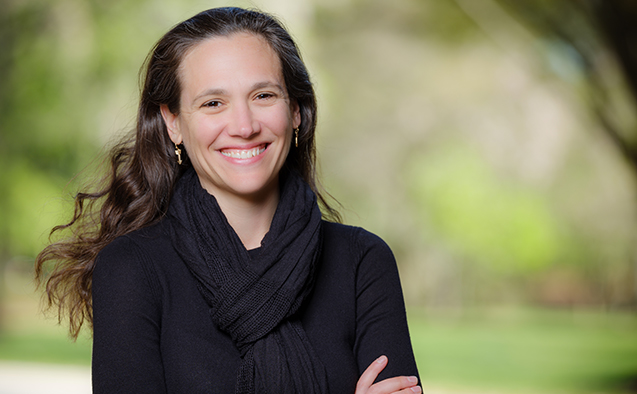Take 5 with Christina Soriano
Christina Soriano
Associate Provost for the Arts, Associate Professor of Dance at Wake Forest University
1. How do you define success for yourself? What has helped you to be successful?
My ever-evolving definition of success is multi-pronged. How am I supporting my colleagues and students who rely on me? Am I helping them do their best work? Am I sharing time, love and attention with my family? Can I go to bed tonight knowing I got through enough on my to do list to wake up in the morning and feel proud of how I will start my day? Success is an ever-changing landscape. In many ways, I tend to focus on the trees in front of me rather than contemplating the whole forest. The people in my life (professionally and socially) who remind me it’s ok to think about the whole forest are the ones that have encouraged me to proceed with (and not apologize for) my ambitions and the bigger visions I have. When I allow myself to go there, I tend to find a powerful version of success. When that happens, I let the impostor syndrome go away. I am working on finding that zone a little more…
2. Think of a time that you faced a challenge, obstacle, or roadblock. How did you get through that and what did you learn?
I feel like roadblocks I’ve encountered never really go away; in fact, I seem to find more of them! But coincidentally I get better at getting back up after I stumble. I often remind myself that this is a long game and I am only getting started. There are four rules that I share with my students about the four rules of improvisation. These came to me from an improvisation collective I’ve worked with called the Architects, who discovered them in the social psychology work of Dr. Angeles Arrien. The rules of improvisation (and I would argue, of life) are:
Show Up.
Pay Attention.
Tell the Truth.
Don’t Get Attached to the Results.
I teach these rules to my students and my daughters, I apply them in my research, and I like to think I live by them everyday, too.
3. Who are your people (either by name or role) who help you to be successful/confident/intentional/reflective/any other descriptor you want to use? And how have they helped you?
Nina Lucas (Chair Dept of Theatre and Dance) has taught me how to step away from a problem and give it reflective time before reacting. Rogan Kersh has shared a boundless energy and enthusiasm about Wake Forest that is contagious. Cindy Gendrich has been a mentor, thought partner, and artist leader. Christina Hugenschmidt, my neuroscience collaborator, made fall in love with my field (dance) in a way I never knew was possible. My husband and two daughters teach me how patience and love need to always go together.
4. How did you find your people?
I tend to show up where I am maybe not expected. This is different from not being invited. Once I keep showing up where perhaps I am an unlikely person in the room, I find there are often super interesting people there. These are people that I regularly want to spend time with, learn from, and be inspired by… and once in a while, that feeling is mutual.
5. What advice would you give to Wake Forest students as they look for their people?
As you look for your tribe, know that often, you will find them in the spaces you would expect them to be. They will be like your favorite pair of jeans or a comfortable sweatshirt. But sometimes, in order to find your people you also have to take risks and go to unfamiliar territories. And then other times, there are people in the environments you know intimately and clearly, but yet they will enliven these once familiar spaces in new, exciting, and maybe even strange ways. Regardless, I would keep those people around…that’s where growing happens.

